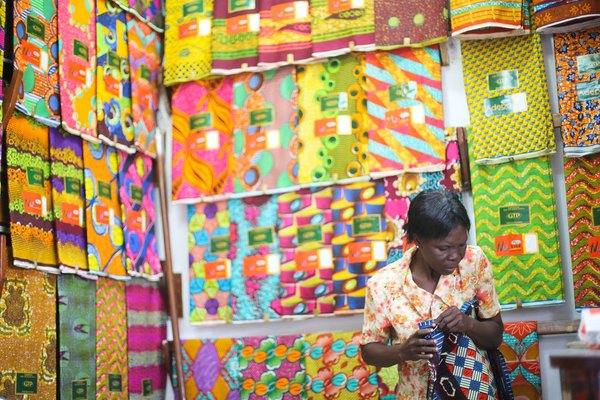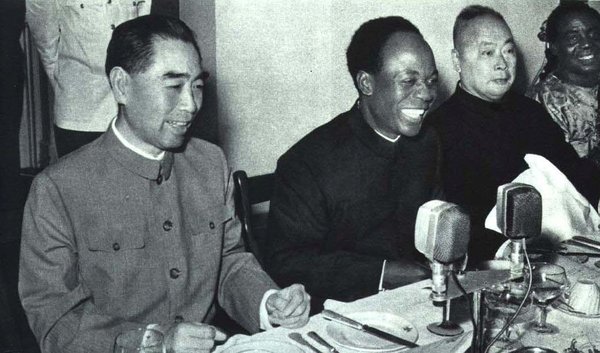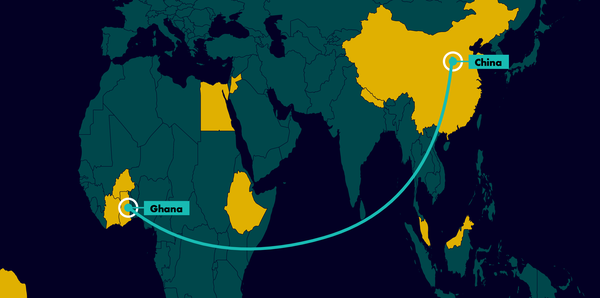
One of the entrances to the giant wholesale markets of Yiwu. Photo by John Lam/Flickr. CC BY-NC 2.0
Yiwu is a world-famous small commodity distribution centre, where many African businessmen come for business opportunities every year. According to an official statistic of the Yiwu government in 2018, nearly 100,000 African businessmen enter China every year, and more than 2,500 of them choose to settle in Yiwu. Missing from this data is information on African women entering Yiwu to do business. This is further reflected in the media coverage on business in Yiwu, much of which is focused on African businessmen. During our fieldwork in Yiwu, we mainly encountered African businessmen, thus the focus of this blog is on them and their experiences.
While the distribution of age and gender is uneven, according to the information obtained by our research team during the field study in Yiwu, men account for at least 90% of African business owners in Yiwu. More than half of these men are under the age of 30. Most of them are also unmarried. So, what is the cause of this gendered distribution?
The relatively low proportion of women as business owners may be due to social norms. In many families, women are often given the responsibility of caring for the family and children, which means that women entrepreneurs often need to strike a balance between work and family. The difference between male and female entrepreneurs can also be explained by access to capital. In many cases, women have more difficulties establishing business networks and obtaining loans. Yet despite this, African women entrepreneurs dominate in soft commodities, importing fashion and trendy items such as jewellery. Thus, as independent female migration becomes a major feature of African migration, more disaggregated data is needed to reflect the gendered dynamics of their experiences.
Migrating to Yiwu to build a business
Why are most African businessmen in Yiwu young, while older men choose to return home? The answer lies in migrants’ motivation to make the journey to Yiwu. In our interviews, we learned that migrants move to Yiwu not to establish a permanent home, but to earn more profits. Their hard work in Yiwu serves the families and businesses of their home country.
Institutional reasons do exist, but they are not enough to explain this phenomenon. According to the African businessmen we interviewed, in practice, it is not easy for African businessmen over the age of 60 to get visas. As a result, it is difficult for most businessmen to live in China for the rest of their lives: unless they choose to marry locals, they will eventually have to return to their homeland. Therefore, choosing to return when reaching a certain age is also an active avoidance of the risk that the visa cannot be renewed when it expires.
Another reason lies in the business model of these African businessmen. Although they buy goods from all over the world, their home countries are still their base, the main market for their products and the location of their families. Yiwu is only a foreign restock market in their business career.
Why do migrants choose Yiwu?
From our research, we established that there are three main reasons that migrants choose to live in Yiwu. Firstly, compared with other metropolises along the coast of China, Yiwu has lower rents and prices which means lower business costs for businessmen. Secondly, the existence of Yiwu’s small commodity market brings together products from all over the country, and many shops in the market are set up directly by commodity manufacturers. This makes it possible to find opportunities to connect directly with manufacturers and that means lower prices when restocking. Thirdly, there is a growing network of Muslim businessmen in Yiwu. In Yiwu, more than 50% of foreign business people are from West Asia and North African countries (especially Iran and Egypt). Therefore, the existence of some local mosques and chapels makes it easy for newly arrived Muslim merchants to integrate into this network.
However, there are still many difficulties in long-term settlement in Yiwu. The costs of purchasing housing at more than CNY 20,000 per square metre makes renting a house a realistic option. However, renting a house in China does not give long-term stability: it is common to rent a new house every two or three years. Due to rising rents or other factors. In addition, differences in language, habits and religion also make it difficult for these businessmen to integrate into the local community. One example was provided by a businessmen from Mali who gave us his views on issues of marriage. Our respondent told us that, for him, the first choice of a wife would not be from the local Chinese community: differences between African men and local women with regard to beliefs, diet and daily norms, and cultural barriers, create significant obstacles to the formation of transnational families.
During our interviews, young businessmen from Mali told us that they preferred to marry Malian women introduced to them by their parents. This is because these women are often considered to be morally secure, which is an important basis for family harmony in the future. The preference to establish long term relationships with women from the country of origin greatly weakens the motivation of African businessmen to settle in China. All these factors mean that Yiwu is considered a good place for business, and only for business.
Moreover, business activities in Yiwu are onerous. A young businessman interviewed by our research team had to work until two o'clock in the morning to finish the day's work. Therefore, as they grow older, men become increasingly unable to undertake such activities. This is because middle-aged businessmen need to spend more time dealing with various household chores. In addition, their children and wives in their home countries prefer them to return from China. The combination of these two factors makes it a better choice for older African businessmen to return home and let younger men take over their jobs in Yiwu.
Yiwu continues to attract often young African businessmen. Young people coming to Yiwu to do business is not only their own choice, but also for the need of the family. This shows the unique career of African businessmen in Yiwu. When they are young, they follow their elders to Yiwu to undertake business tasks and learn business skills. As they grow older, the loneliness of staying alone in China and the need to take over the operation of companies in their home countries leads them to return home. In the end, understanding the gendered aspirations and motivations of African businessmen is important when considering the importance of Yiwu in the story of migration from Africa to China.



